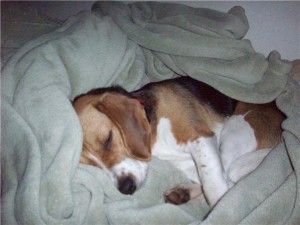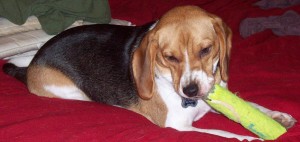June’s Mystery Illness Remains Mysterious
 It’s not a complete mystery. Everyone seems pretty sure she has salivary mucoceles, but beyond that, she likes to remain an enigma.
It’s not a complete mystery. Everyone seems pretty sure she has salivary mucoceles, but beyond that, she likes to remain an enigma.
I couldn’t tell you when exactly we first started noticing the swelling under her chin, but it finally got bad enough that we took her in for a second opinion. The vet took an aspiration, but we were all certain it would come back saliva and that the diagnosis would be that once of the blocked salivary glands was leaking. From there, the recommendation would be surgery.
However, the lab came back with results consistent with inflammation. So, the vet referred us to an internal medicine specialist. We saw him one week ago today. He was quite nice, read through June’s chart, talked to us, and told us that while he could understand why the other vet was confused by the results, he thought they were still completely consistent with a mucocele and leaking saliva. Since saliva has enzymes in it to break down food, it would naturally irritate the sensitive tissue it was leaking into and cause something that looked like inflammation. He decided that we really needed to see the surgeon and that we should just pretend the internal medicine visit never happened. (And he really meant it- we weren’t charged for the consultation, despite the fact that we took up his time, he did an analysis of the situation and referred us to a treatment plan.)
At the time of last Thursday’s visit, the swelling under June’s chin was bad enough that it was affecting the way she yawned. Thursday afternoon, she got sick- nothing major, GI issue that left her listless and not wanting to eat, but her fluids were fine, and she was still willing to go out and do her business. We cancelled our plans for the evening, but less than 24 hours later she was fine.
Does this have anything to do with anything? No idea, but by the time our roommate arrived home from his European vacation on Sunday night, the swelling under June’s chin was gone. Not just reduced, but really, just gone.
Tuesday we took June in to see the surgeon. The first thing she told us is that she had never seen the bilateral mucosele in a dog before. (Which makes us a little more forgiving of our regular vet for keeping wanting to run tests, since the condition is rare enough that even the specialist had never seen it before.) This adds a bit of a complication if we can’t determine exactly which side has the leak. You see, dogs have 6 salivary glands- three on each side. Two of those are connected. It is normally one of the connected glands that is blocked, so when they remove them via surgery, they take both. Removing two salivary glands of six isn’t a big deal, but the vet has no idea what would happen if we had to remove four. She says that’s something she’ll need to research.
But the swelling that had started this whole journey isn’t there anymore. The vet asks if they can do an ultrasound. Ultrasounds are great at showing fluids, and even though the swelling is pretty much gone, we all think there should still be fluid, and they think that will give us a course of action.
We agree. They call the radiologist. He can be there in an hour. We leave Junebug with the vet and expect to collect her in a couple of hours. On the way out, we pay a deposit on the ultrasound.
 A few hours later I get a call from C. The vet has called him. He can’t go pick up June just yet because they had to sedate her. It’s not something they usually need to do for ultrasounds, but they couldn’t get her to keep the neck extension they needed. (This does NOT surprise either of us.) So, they want to keep her a little longer to make sure she’s recovering well from the sedation. No issues there.
A few hours later I get a call from C. The vet has called him. He can’t go pick up June just yet because they had to sedate her. It’s not something they usually need to do for ultrasounds, but they couldn’t get her to keep the neck extension they needed. (This does NOT surprise either of us.) So, they want to keep her a little longer to make sure she’s recovering well from the sedation. No issues there.
But here’s the thing. The ultrasound didn’t show anything. No fluids whatsoever. They looked at the glands and the ducts from the glands. The ducts all look healthy- no blockage, no damage. There’s apparently not quite enough scientific evidence to say whether the glands themselves looked normal for a Beagle, but the ducts were good.
This means we have no course of action, because we don’t know what caused the swelling. The surgeon thinks there are two possibilities-
1) That the swelling will return, and when it does, we should call and schedule an ultrasound. She thinks this is the most likely scenario.
2) That Junebug had the salivary equivalent of a kidney stone blocking one of the ducts and that it finally passed. If that’s the case, then who knows if this problem will ever show up again.
 The good news is- nothing is currently indicating that June needs surgery. In addition, because the ultrasound didn’t show anything, they decided not to charge us for it. (Which I really don’t understand- they had to call the radiologist and ask him to come to the office. They did the ultrasound.) Between that and the IM vet not charging us, where we should be out over $650, it’s cost us less than $200.
The good news is- nothing is currently indicating that June needs surgery. In addition, because the ultrasound didn’t show anything, they decided not to charge us for it. (Which I really don’t understand- they had to call the radiologist and ask him to come to the office. They did the ultrasound.) Between that and the IM vet not charging us, where we should be out over $650, it’s cost us less than $200.
The bad news is- we still have no idea what’s going on with June, no real answers, no plan of action, just more sitting and waiting.
June suffers no ill effects from the hard glands at the back of her jaw. She eats and drinks fine. She drools the normal amount. She licks the same as she did before. As we told the vet, it is very possible the glands were hard before the sting and infection that caused us to notice them. Before that, we really didn’t have cause to be pressing against her neck and jaw line, so who knows.
Which leaves me with a question. If I have any other Beagle owners reading this- have you ever felt along your dog’s neck and jaw line? Is it possible that Beagles just have harder back salivary glands, or that it’s somewhat common for them to harden with no actual ill effects?
I know ladies are supposed to keep the mystery alive, but I would really love for my baby girl’s health not to be an enigma.

